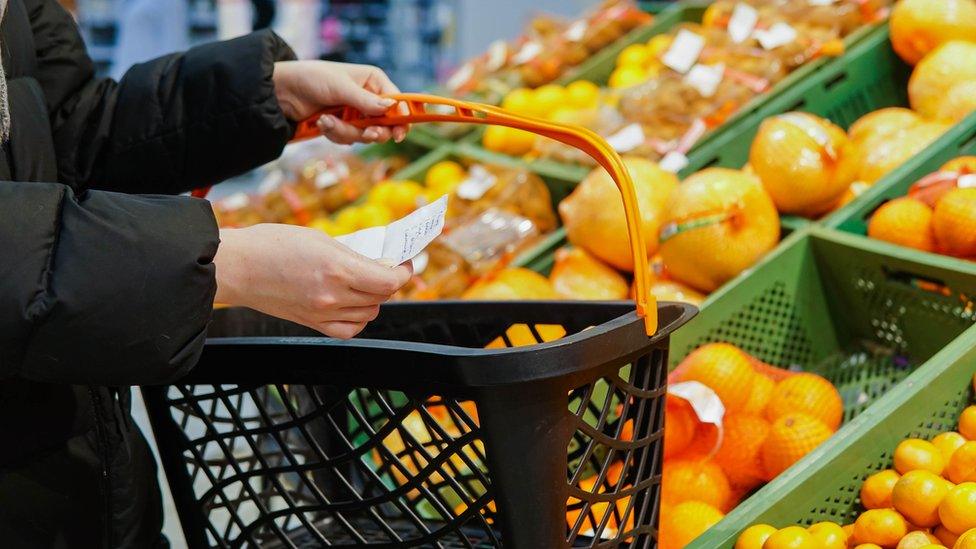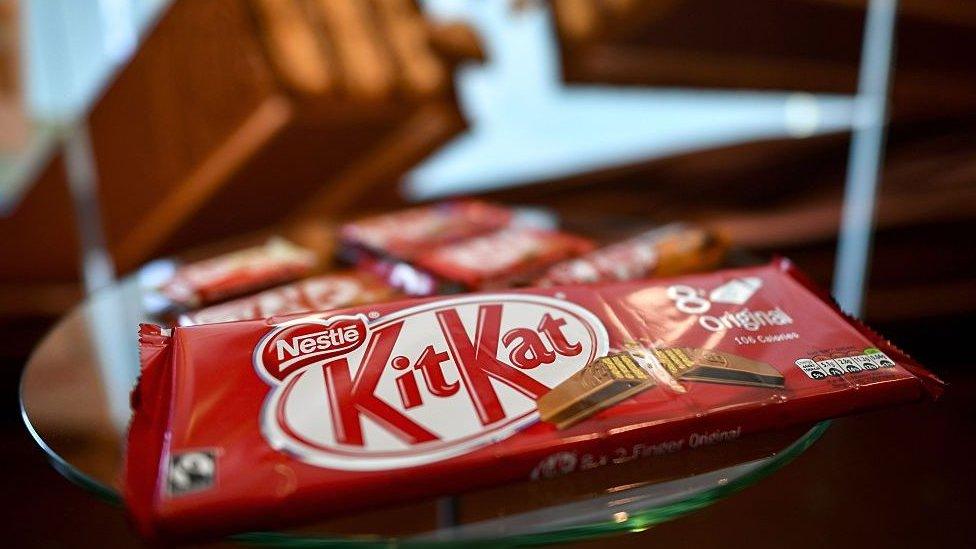Some supermarket food prices 'should fall' soon
- Published
- comments

The cost of a food shop "should start" to come down in the next few months, the body which represents UK supermarkets has claimed.
Supermarkets will start passing on cost savings for milk and other dairy goods due to cuts in wholesale prices, the British Retail Consortium (BRC) said.
It comes as new figures from the trade body revealed food prices were up 15.7% last month compared to April in 2022.
Last week, Sainsbury's rejected suggestions that prices were too high.
The denial came after questions over why a drop in the cost of wholesale food prices globally had not yet led to falls in the prices charged by UK supermarkets.
Helen Dickinson, chief executive of the BRC, said customers should "start to see food prices come down in the coming months as the cut to wholesale prices and other cost pressures filter through".
She said that retailers were "committed to helping their customers and keeping prices as low as possible".
Many households have felt the impact of rising food bills.
Major consumer goods companies and supermarkets have blamed higher costs for higher prices.
Marmite-maker Unilever and supermarket Sainsbury's both recently rejected suggestions that they are not protecting customers from rising prices.
While overall food inflation rose in the year to April, according to the figures from the BRC-NielsenIQ shop price index, fresh food prices accelerated last month to 17.8%.
Ms Dickinson said some goods, such as ready meals, had risen in price because of a "knock-on effect from increased production and packaging costs".
She added the price of coffee had jumped because of an increase in the cost of coffee beans, as well as key producers exporting less.
However, she said the price of select items like butter or vegetable oils had already started to come down as retailers passed on some savings.

Wholesale food prices have started to fall and the World Bank, which works on solutions to reduce poverty in developing countries, has said it expects them to drop 8% by the end of this year.
But supermarkets have argued such falls take time to reach the shelves. The BRC has said there is a three- to nine-month lag to see a decrease in wholesale prices reflected in-store.
In March, the union Unite accused some retailers of "fuelling inflation by excessive profiteering".
The boss of Sainsbury's said the supermarket would pass on any falls in the price of goods as soon as it could and was "absolutely determined to battle inflation for our customers".
However, Simon Roberts admitted widespread price falls were not likely to come soon as energy and labour costs continued to rise.
Victoria Scholar, an analyst at investment firm interactive investor, said while there was "hope" that food prices will come down, it was "more likely that price growth will just slow instead in the near-term as consumers continue to feel the squeeze from rising weekly food bills".
"The unfortunate nature of the type of inflation the UK is facing is that it is affecting essential items such as food, hitting those at the lower end of the income spectrum most acutely," she added.
While overall food prices continued to rise in April, the BRC said inflation, which is the rate at which prices rise, both food and non-food, had fallen marginally to 8.8% in April.
But just because the inflation rate has fallen, that does not mean prices are falling, it just means that prices are not rising as quickly.
The BRC said overall price rises in the shops had slowed slightly in April because of "heavy spring discounting in clothing, footwear, and furniture".


How are you coping with the cost of living crisis? Tell us by emailing: haveyoursay@bbc.co.uk, external
Please include a contact number if you are willing to speak to a BBC journalist. You can also get in touch in the following ways:
WhatsApp: +44 7756 165803, external
Tweet: @BBC_HaveYourSay, external
Or fill out the form below
Please read our terms & conditions and privacy policy
If you are reading this page and can't see the form you will need to visit the mobile version of the BBC website to submit your question or comment or you can email us at HaveYourSay@bbc.co.uk, external. Please include your name, age and location with any submission.



- Published25 April 2023

- Published26 April 2023
